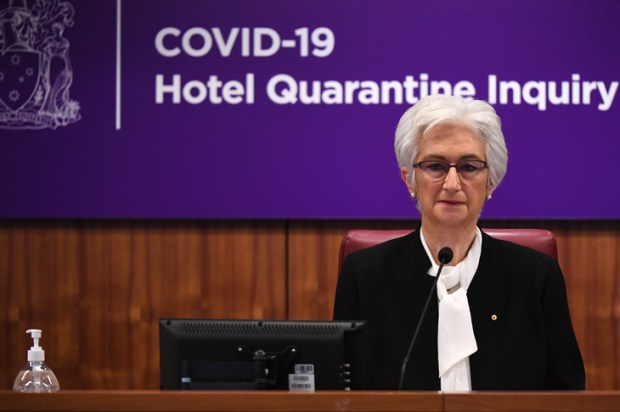Every idea is an incitement
When the outgoing 45th President of the United States vouchsafed to his audience at The Ellipse in Washington DC on 6 January 2021 ‘If you don’t fight like Hell, you’re not going to have a country anymore’, the day might well be described, in retrospect, as one of an epiphany.
And now it is, in effect, recorded as such in the US House of Representatives resolution HR-24 of the 117th Congress passed a week later impeaching the President for ‘High Crimes and Misdemeanors’ – the language of Article II, section 4 of the US Constitution. The House had been supplied with a long report by the Majority Staff of its Committee on the Judiciary opining that President Trump’s offending sentence was, in context, an ‘incitement to insurrection or rebellion’ and a cross-partisan majority of the House agreed after considering the report for the allotted two hours.
The immediate ‘context’ was the procession to the nearby Capitol building of persons who had heard the President’s words quoted above, the entry (forced or otherwise) of some or many of them to the Capitol, and the ensuing outbreak of appalling mob violence leading to deaths and destruction, some, much or all of it recorded by who knows how many devices.
There has already been one serious criminal charge laid against an alleged participant in the mob violence, and it seems highly likely that there will be more arrests. Having regard to the gravity of what occurred, it is to be hoped that a thorough investigation (or co-ordinated investigations including that instituted by US Attorney for the District of Columbia) can be completed as soon as reasonably practicable so as to make public as complete a picture as is ascertainable. In that regard, there is a lesson to be learned from the breakdown in law and order in the streets and parks of Charlottesville, Virginia on 17 August 2017. There has been only the most passing reporting in the Australian media of the findings of the very detailed independent report on those events obtained by the City of Charlottesville and its findings as to the multiple causes of the violence and the breakdown of law and order. Nor did the Australian media cover the subsequent court proceedings instituted by the City against armed Left and Right militia formations which had travelled to Charlottesville and had engaged in violent disruptive behaviour. They all consented to a court order forbidding them from returning to Charlottesville on the first anniversary of the deaths and destruction.
For the many foreigners who would not be expected to have an appreciation of US constitutional law, it is important to be clear about what impeachment is. First, in everyday speech, HR-24 is the specification of a charge against the president. Secondly, it is now for the US Senate to conduct a trial of that charge in a proceeding presided over by Senator Patrick J. Leahy, as Senate President pro tem. Finally, the foregoing summary is where the very sparse formal similarity with a fair trial of a criminal charge in a court ends. In reality, as critics of the impeachment and trial of President Clinton were heard to say, it is, inherently, a form of vengeful partisan political theatre of the absurd.
Then there are the words ‘incite’ and ‘incitement’. Australian lawyers are acquainted with the case law dealing with the problems of interpreting those inherently very elastic words and applying them prospectively and retrospectively to the facts of any given case.
It is not necessary to take any position on the Trump presidency in general, or specifically what he said ‘in context’ on 6 January, 2021, to be realistic about his standing in the eyes of his antagonists not only in the US but around the globe. Even if attention is confined to the US, who can doubt that his antagonists hate him above any other individual on the planet – exemplified in the ‘Trump is worse than Hitler’ trope. As happened early in his presidency and permissibly under the First Amendment to the US Constitution, a prominent comedienne disseminated worldwide a staged presentation posing in the aftermath of the (hoped for?) decapitation of President Trump by holding out his severed head. This did not amount to relevant incitement because it is protected by the First Amendment.
There should be a thoroughgoing public debate on the incitement controversy. In the US, protected incitement has been at the forefront of First Amendment controversy and litigation for more than a century. During the first world war and in the 1920s there were many incitement prosecutions of leftist radicals arising from anti-war and revolutionary speech. In Gitlow v. New York (1925), in their historic joint dissent, Justice Oliver Wendell Holmes and Justice Louis Dembitz Brandeis had this to say about criminalising ‘incitement’:
Every idea is an incitement. It offers itself for belief, and, if believed, it is acted on unless some other belief outweighs it or some failure of energy stifles the movement at its birth. The only difference between the expression of an opinion and an incitement in the narrower sense is the speaker’s enthusiasm for the result. Eloquence may set fire to reason. But whatever may be thought of the redundant discourse before us, it had no chance of starting a present conflagration. If, in the long run, the beliefs expressed in proletarian dictatorship are destined to be accepted by the dominant forces of the community, the only meaning of free speech is that they should be given their chance and have their way.
That soon became the prevailing view, and in Brandenburg v. Ohio (1969) the US Supreme Court reformulated the test by expanding ‘protected incitement’ somewhat. There is obviously no such presidential ‘enthusiasm’ for the appalling Capitol mob violence in the words which HR-24 seizes upon, just as there is obviously no enthusiasm in HR-24 for preserving, protecting and defending First Amendment jurisprudence.
Got something to add? Join the discussion and comment below.
Get 10 issues for just $10
Subscribe to The Spectator Australia today for the next 10 magazine issues, plus full online access, for just $10.
You might disagree with half of it, but you’ll enjoy reading all of it. Try your first month for free, then just $2 a week for the remainder of your first year.














Comments
Don't miss out
Join the conversation with other Spectator Australia readers. Subscribe to leave a comment.
SUBSCRIBEAlready a subscriber? Log in